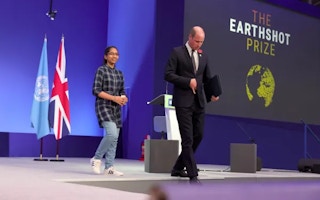A global environmental prize founded by Britain’s Prince William will hold its third annual awards ceremony in Singapore on 7 November.
To continue reading, subscribe to Eco‑Business.
There's something for everyone. We offer a range of subscription plans.
- Access our stories and receive our Insights Weekly newsletter with the free EB Member plan.
- Unlock unlimited access to our content and archive with EB Circle.
- Publish your content with EB Premium.
The Earthshot Prize, founded in 2020, is aimed at supporting innovative projects that tackle climate change and protect the planet. Submissions are open to any individual, company or government with workable sustainability solutions.
Five winners will each be awarded £1 million (US$1.2 million) to help them scale their environmental solutions.
The finalists will be announced later this year.
One winner will be chosen from five categories supported by the United Nations Sustainable Development Goals: 1) Protect and support nature, 2) Clean our air, 3) Revive our oceans, 4) Build a waste-free world, and 5) Fix our climate.
Here are five business ideas from Asia that have been shortlisted or awarded over the years.
1. 2022 finalist: Flowercycling in India
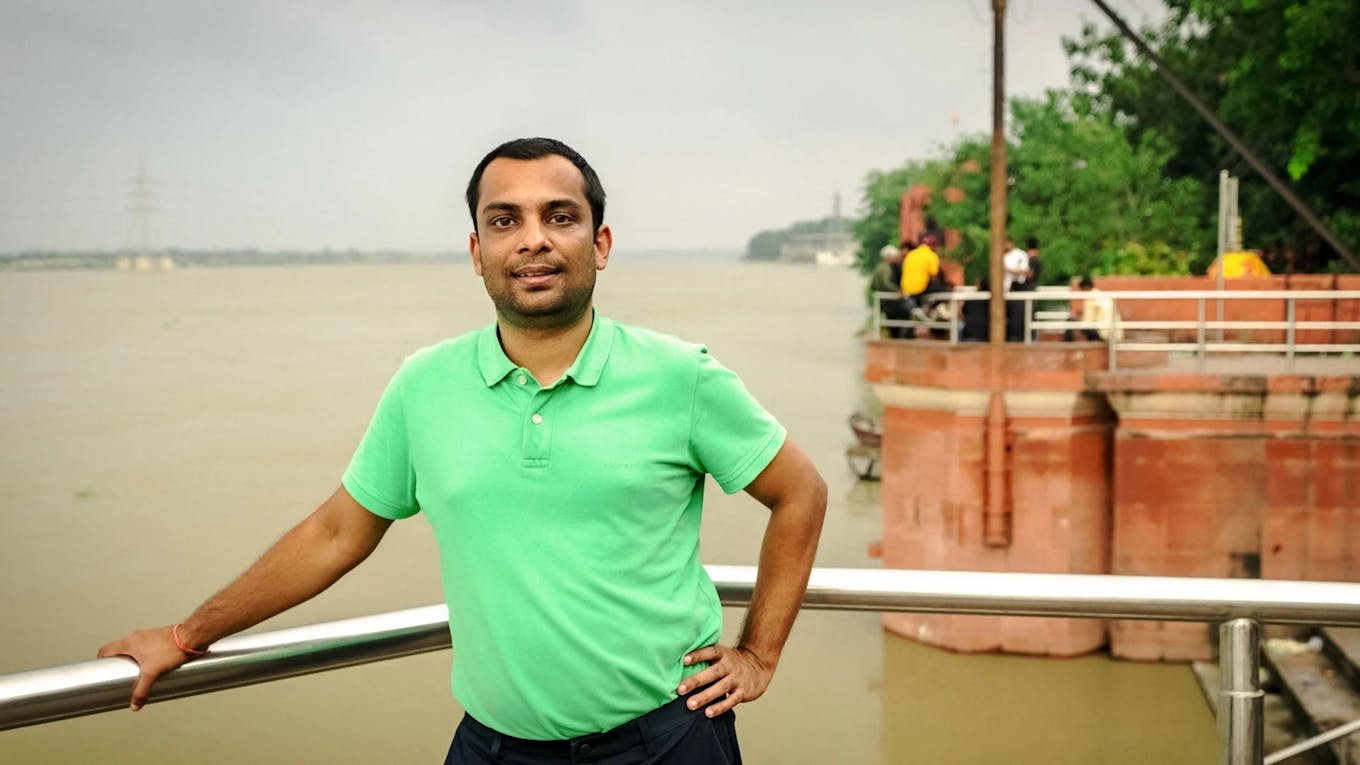
Fleather, the world’s first profitable and lean solution to “temple-waste”. Image: The Earthshot Prize
His eureka moment came about during the festival of Makara Sankranti in 2015, when Ankit Agarwal and a friend, Prateek Kumar, watched pilgrims drink water from the Ganges river.
The Ganges, which is a lifeline to 420 million people, is the second most polluted river in the world. Its polluted state is the result of local temples dumping used flowers containing toxic pesticides into the water.
Together with his friend, Agarwal founded Phool to address the problem.
At first, Phool collected floral waste and turned it into incense sticks. But during the manufacturing process, Kumar stumbled upon a new use for discarded flowers. A thick mat-like substance began to grow over the unused fibres on their factory floor.
They realised that this mat could be turned into a sustainable alternative to animal and plastic leather. They called the new material Fleather.
Since then, Phool has collected 13,000 tonnes of floral waste, and they now create 90 square feet of Fleather each day. By doing so, they have created employment opportunities for a marginalised community.
Phool today employs over 163 female ‘flowercyclers’ from the Dalit caste who collect waste flowers. In time, their hope is for this number to reach 5,000.
2. 2021 finalist: Peer-to-peer energy trading in Bangladesh
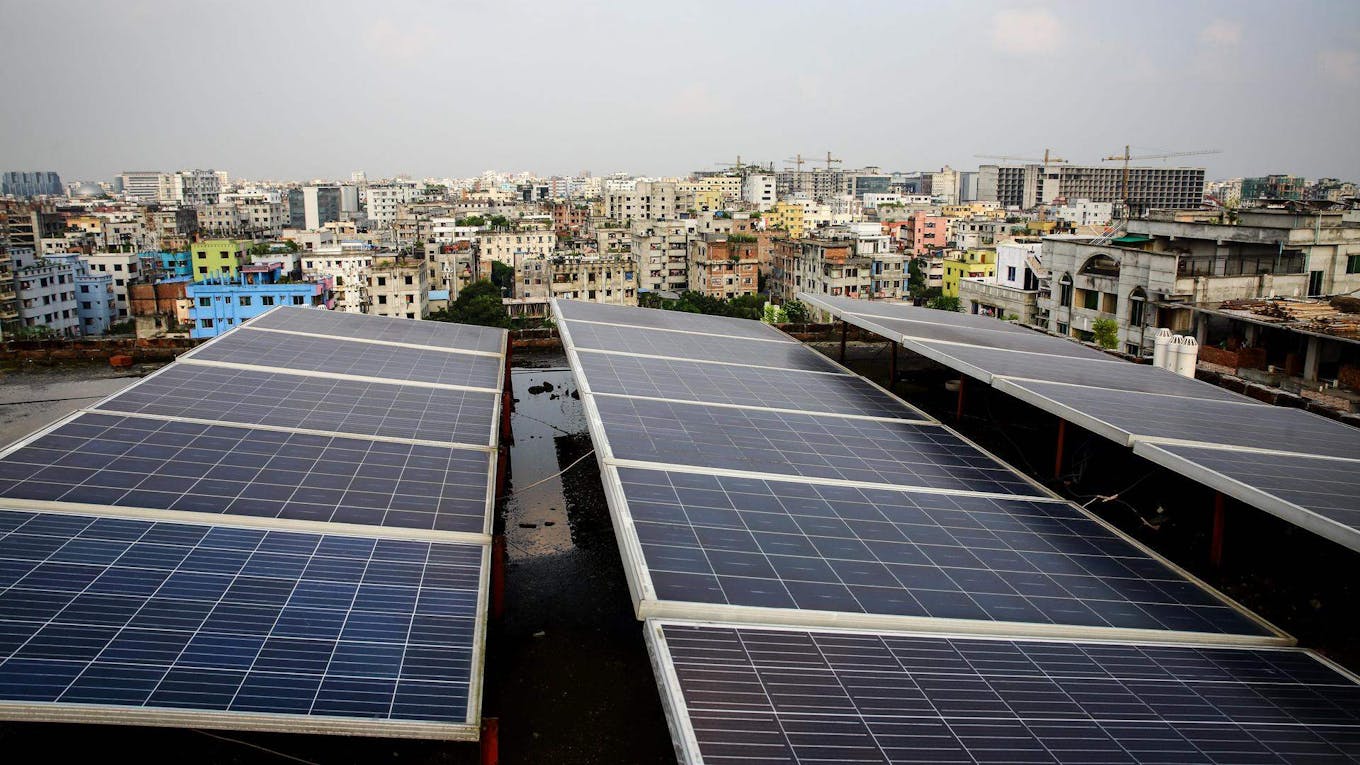
With the support of several Earthshot Prize Global Alliance Members, SOLshare has expanded into rooftop solar with a pipeline of north of 10 megawatts. Image: The Earthshot Prize
Bangladesh-based SOLshare is the world’s first peer-to-peer energy exchange network.
Homes with a rooftop solar panel can sell any excess electricity into a microgrid network for others to purchase.
It not only helps the environment, but also gives poor communities a new and plentiful source of income.
In the time since being named an Earthshot finalist, the SOLshare team has achieved a national first in Bangladesh: connecting a solar microgrid to the national grid. This has enabled households to earn more income from selling their surplus solar energy.
SOLshare’s 117 solar grids have benefited more than 10,000 people in remote communities. They also reduce emissions by 30 per cent and make money for its “prosumers” (a portmanteau of the words producer and consumer) in real-time. Energy trading has seen some household incomes rise by 25 per cent.
3. 2022 finalist: Battery-powered construction sites in Hong Kong
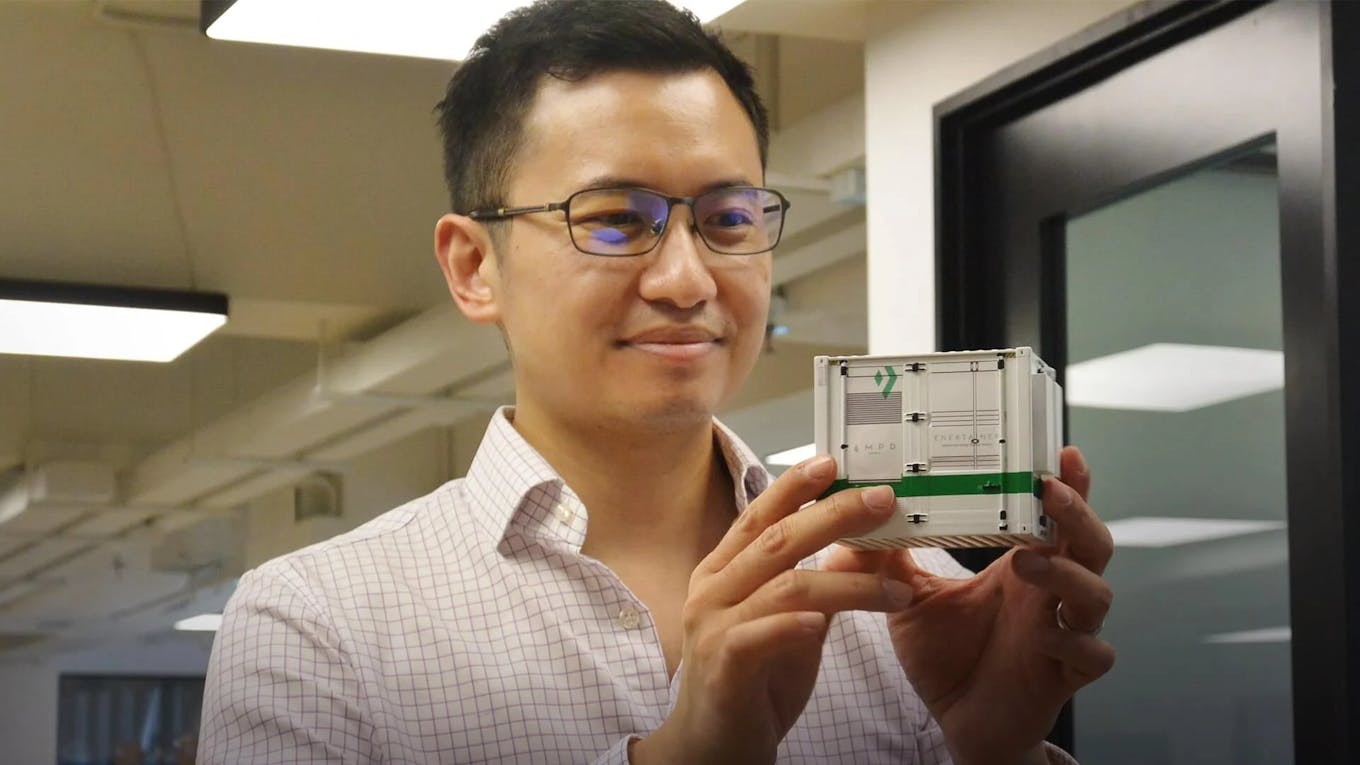
Currently adopted by almost 100 construction projects, Ampd’s products have saved over 17,000 tonnes of carbon pollution to date while reducing costs. Image: The Earthshot Prize
Today, construction is responsible for almost 11 per cent of the world’s energy-related carbon emissions, partly because building sites require a lot of power and often need mobile energy sources. To tackle this issue, Hong Kong entrepreneur Brandon Ng and his team founded Ampd.
Ampd’s flagship product is the Enertainer, an all-electric battery energy storage system designed to power construction sites without the need for direct use of fossil fuels.
The system can power any type of electrical equipment — cranes, hoists, welders, barbenders — with its lithium-ion batteries, similar to those used in electric cars.
Every switch from a diesel generator to an Enertainer curbs 130 tonnes of carbon dioxide emissions a year, on top of removing the emissions equivalent of three hundred petrol-powered cars from the road.
4. 2022 winner: Greenhouses for smallholders in India
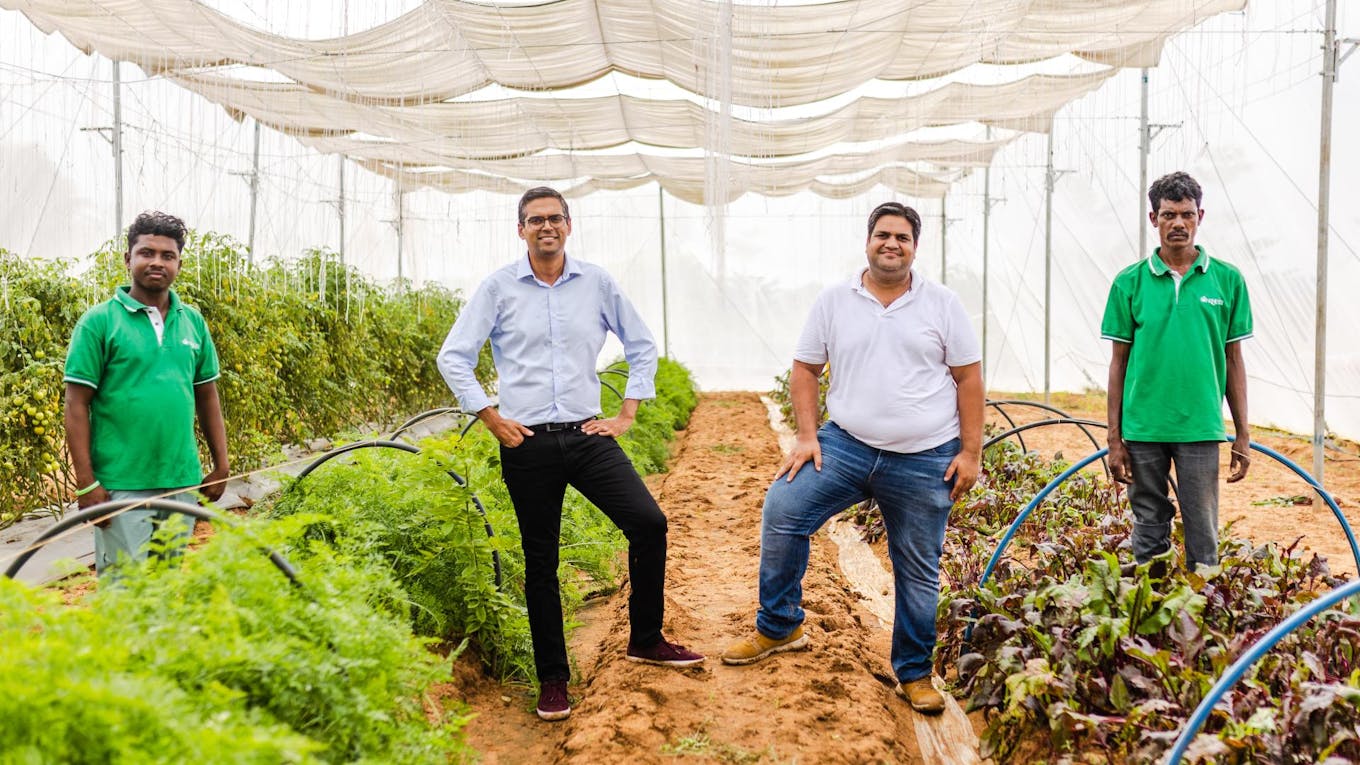
Kheyti’s goal is for 50,000 farmers to have a Greenhouse-in-a-Box by 2050, up from the 1,000 farmers currently. Image: The Earthshot Prize
India is home to 100 million smallholder farmers and the nation is one of the countries that is the most heavily affected by climate change. In 2022, it recorded one of its worst heat waves on record, which led to a widespread drop in crop harvests.
Kheyti, an Indian startup, has developed a simple business solution that is already having considerable impact.
Its Greenhouse-in-a-Box is designed for smallholder farmers and the crops they grow, offering shelter from unpredictable elements and pests. Kheyti also trains and supports local farmers to ensure that the efficiency of their greenhouses is maximised.
Plants in grown in greenhouses require 98 per cent less water than those outdoors and yields are seven-times higher. 90 per cent cheaper than a standard greenhouse, Kheyti’s greenhouses are more than doubling farmers’ incomes, enabling them to invest in their farms and their children’s education.
5. 2021 finalist: Water recycling in Japan
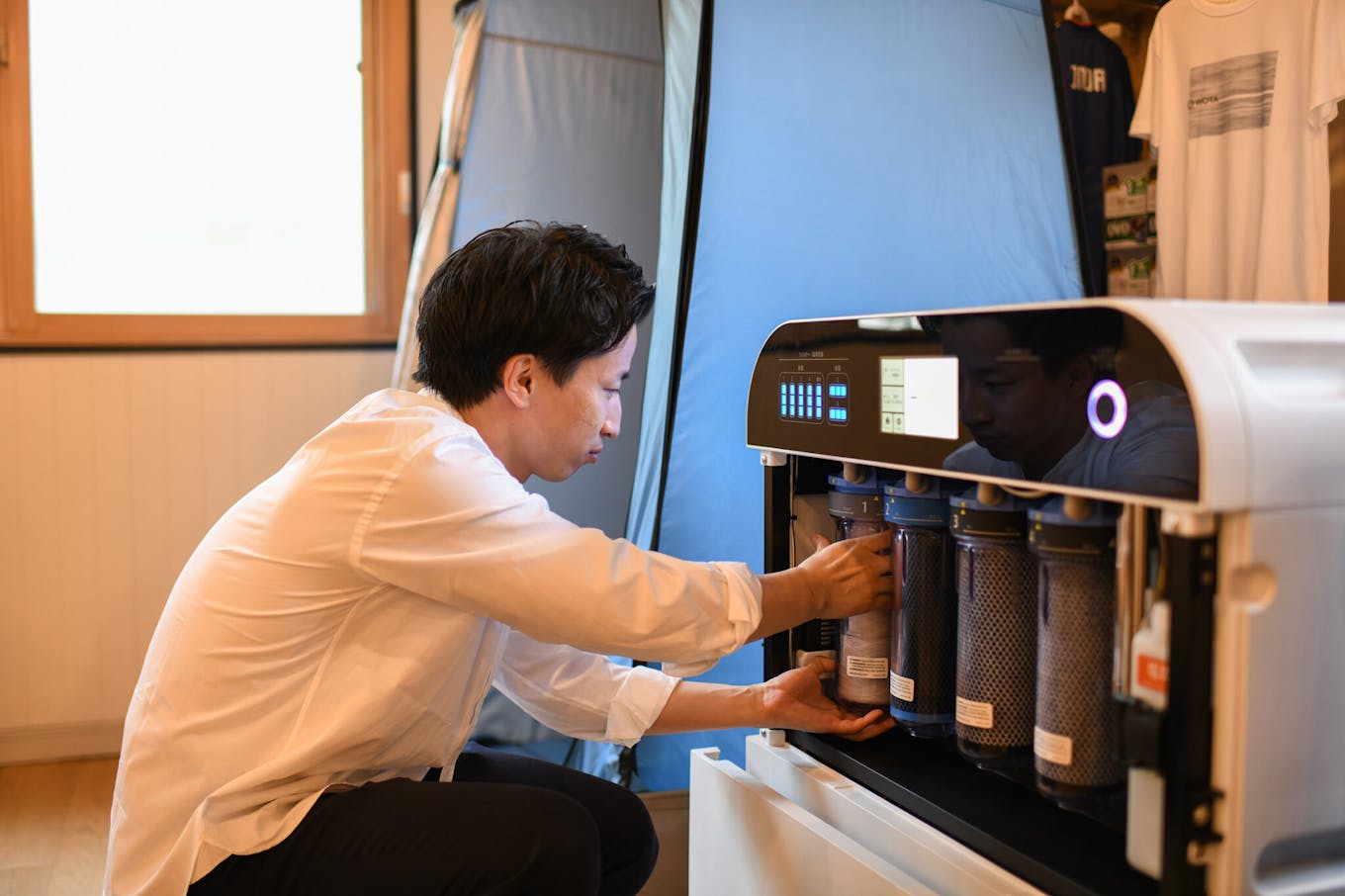
The WOTA BOX is only a fraction of the size of a typical water treatment plant. Image: The Earthshot Prize
Climate change and population growth are already driving water shortages around the world. WOTA, a Japanese start-up, set out to improve water security globally.
Founded in 2014, WOTA’s water recycling system turns more than 98 per cent of wastewater into freshwater.
A fraction of the size of a typical water treatment plant, WOTA BOX is over 50 times more efficient and can be delivered at scale. Plus, installation does not require any existing infrastructure.
The result: less wastewater pollution and reduced water scarcity in times of drought.
In the time since becoming an Earthshot Prize finalist, the company has enjoyed inbound requests from around the world, embarked on a new partnership with Antigua and Barbuda and is on track to launch pilot projects in multiple countries. They are also in ongoing discussions with their home government in Japan about introducing WOTA to rural parts of the country.

